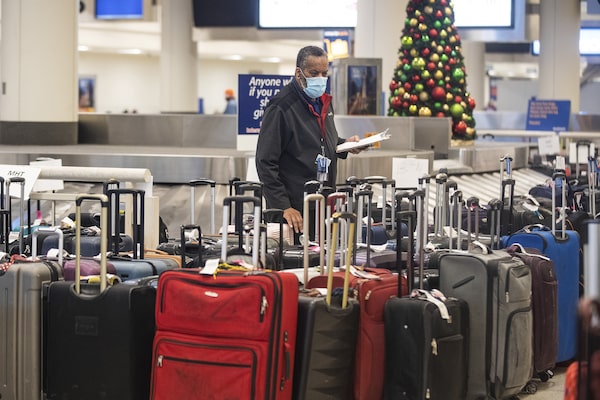
A pile of lost suitcases near the baggage carousel at Midway Airport in Chicago on Dec. 27, 2022.Pat Nabong/The Associated Press
The must-have travel accessory of 2023 and beyond is insurance to protect against the many ways your trip can be ruined.
Let the travel chaos of the 2022 holiday season be your guide. Flights in some parts of the country were delayed repeatedly or cancelled. Luggage was lost. People were stranded for days on their way to their destinations or back home.
Insurance that covers delays, interruptions, cancellations or lost luggage won’t stop bad weather or get planes moving, but it can ease the financial hit when your plans get squashed by forces beyond your control and may make you more comfortable. Sleep in a hotel, not the airport. Replace essentials in your lost luggage. Get your meals and incidental costs paid for while you wait for your rescheduled flight.
Years ago, about 10 per cent of the people buying travel medical insurance from Martin Firestone of Travel Secure opted for this additional coverage as well. “Now, it’s well over 50 per cent,” Mr. Firestone said. “And it’s only going one way – up.”
With climate change, it’s prudent to expect that weather-related interruptions will continue to be a problem for travellers. Airlines may one day learn to pivot like gazelles when weather affects their schedules, but right now it’s hard to picture this kind of agility.
Insurance for trip cancellation, interruption or delay is for situations in which you have to cancel a trip before or after departure because of an emergency. It may even cover out-of-pocket expenses incurred because your flight was delayed or cancelled.
Mr. Firestone said that without insurance, your best hope of recouping costs for travel delays and cancellations is to seek compensation through the Canadian Transportation Agency. The CTA says airlines must pay compensation of $125 to $1,000, depending on the length of the delay and whether you are flying a small or large airline. Agency officials told a parliamentary committee late last year that they were dealing with more than 30,000 complaints, which could take as long as 18 months to resolve.
Legal action is another avenue for getting compensation from an airline, but who has the time and money for that? The better way is to insure against the risk of a trip going off the rails.
Travel reward credit cards often include trip cancellation/interruption insurance as part of their package of client benefits. But mind the coverage limits if you rely on your card. For delayed flights, $500 per insured person (typically you, your spouse and dependent children) is common. Trip cancellation coverage may top out at $1,500 a person, with a family maximum of $5,000.
Mr. Firestone said a separate trip cancellation/interruption policy might cost 7 per cent or 8 per cent of the value of your trip. “On a $10,000 trip, that’s $800 for the premium,” he said. “But if you had to cancel the night before because someone took ill or something to that effect, you’d get the $10,000 back with very few questions.”
You can buy insurance against travel delays, cancellation or interruption directly from insurers, through brokers or through the CAA. Many sellers of travel medical coverage – essential in its own right – also sell trip delay/cancellation/interruption insurance. Some key points to compare when looking at these policies include coverage maximums and how long a delay needs to be for the coverage to kick in.
If you experience a flight delay or cancellation, travel expert and blogger Barry Choi suggests documenting the situation by taking photos of boarding passes and the screens in airport lounges that show when flights are taking off. For expenses such as hotels and meals, save receipts.
Mr. Choi and his family recently experienced a six-hour delay while flying home from Belize. Instead of waiting at the airport, they headed to a hotel and spent time there before departure. Back home, he submitted a claim for the hotel cost through the credit card he used to book his trip. Documentation for the claim was filed online to the insurer affiliated with his credit card, which in turn e-transferred him the money within 10 days.
“A lot of people I’ve seen in the news are sleeping at airports, they’re complaining about their lost luggage,” Mr. Choi said. “But if you have insurance, you’re entitled to stuff. There’s no reason to panic.”
Are you a young Canadian with money on your mind? To set yourself up for success and steer clear of costly mistakes, listen to our award-winning Stress Test podcast.
 Rob Carrick
Rob Carrick